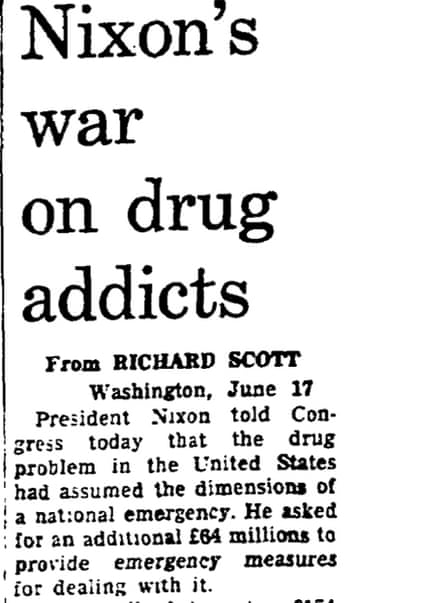1970s
On 18th June 1971 Richard Nixon declared a 'war on drugs', stating that the drug problem in the US had become "public enemy number one". Here, Richard Scott looked at his proposals.

A particular problem in the US and an important factor in Nixon's decision to address the drugs issue was the heroin addiction of many Vietnam veterans. Peter Osnof reported from the Mekong Delta.

Throughout the 70s, the flow of drugs into the US came predominantly from Latin America. Colombia was a major producer of cocaine and large amounts of marijuana and heroin were coming across the Mexican border.

1980s
Gerald Ford's administration pushed the drug war into the background but when Reagan assumed office he renewed it on an even bigger scale than before. William Scobie reported from Los Angeles.

George Bush Senior's administration announced a new anti-drug strategy, with a $7.86 billion funding programme. Martin Walker and Simon Tisdall reported on concerns from critics of the programme.

After years of the Colombian Medellin Cartel shipping cocaine to the US through Panama, George Bush Senior invaded in 1989, overthrowing dictator General Noriega. Martin Walker reported on the operation from Washington.

1990s
Pablo Escobar, a founding member of the Medellin Cartel, was killed by Colombian security forces in 1993, after escaping from prison. Ken Dermotta and Noll Scott looked at the events leading to his death and his influence on the international drug trade.

2000s
In June 2000, Clinton pledged a $1 bn aid package to assist the Colombian government in their fight against drug trafficking. Duncan Campbell reported on Colombia's "civil war".

The Obama administration all but brought an end to the 'war on drugs' with the focus instead on treatment and drug use prevention. Sasha Abramsky considered the new national drug control strategy.

Comments (…)
Sign in or create your Guardian account to join the discussion